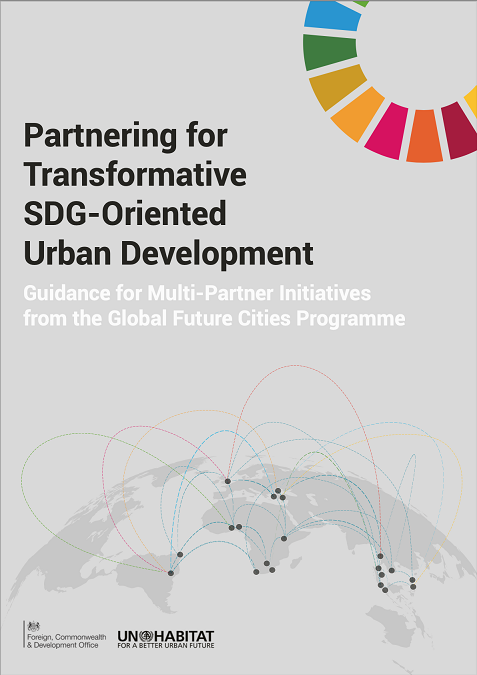GFCP publishes guidance for multi-partner initiatives in transforming SDG-oriented urban development
“[The Global Future Cities Programme (GFCP) has shown that] there are ways of making the Sustainable Development Goals (SDGs) practical, applicable, and relevant in a way that I hadn't really seen before, partly through the SDG workshops, but also through the focus on [the SDGs] within the programme’s paperwork, philosophy, and culture,” said Peter Turner, Programme Lead for the GFCP with the United Kingdom’s Foreign, Commonwealth & Development Office (UK FCDO).
Cities have a huge role to play in accelerating action on the 2030 Agenda for Sustainable Development. All the goals have targets that relate directly to the work of local and regional governments. Local action on the SDGs can contribute to meeting up to 65 per cent of these targets.
To promote action on the SDGs in cities, UN-Habitat has released the publication Partnering for Transformative SDG-Oriented Urban Development: Guidance for Multi-Partner Initiatives from the Global Future Cities Programme, that provides recommendations for international donors, city authorities, UN agencies, and delivery partners about how to design and run multi-partner urban development initiatives that drive transformative impact and accelerate SDG implementation in rapidly urbanising cities.
The GFCP is a three-year multi-partner programme, funded by the UK FCDO, that supports 31 transformative projects to strengthen the enabling environment for sustainable urban development in line with the SDGs. The 31 projects cover 19 cities in 10 emerging economies (Brazil, Indonesia, Malaysia, Myanmar, Nigeria, Philippines, South Africa, Turkey, Thailand, and Vietnam).
As the global programme is transitioning to the next stage, the publication shares valuable lessons for programmes that aim to support urban development projects that are deliverable, fundable, bankable, and sustainable.
Going beyond “business as usual” with a focus on the SDGs
To tackle the interwoven challenges facing cities in the Decade of Action, the Future Cities Programme seeks to go beyond the “business-as-usual" approach to sustainable development. The Programme presents a unique opportunity for sharing best practices and lessons learned.
The GFCP has helped build the capacity of local authorities to steer private sector delivery partners to address the most pressing needs of cities and communities, and integrate social, environmental, institutional, and financial safeguards into project deliverables.
By incorporating UN-Habitat's SDG Project Assessment Tool into project design it has guided project partners to localise the SDGs, thus enhancing the quality of projects. The tool helped embed projects in the local context, ensuring alignment with the SDGs, and identifying constraints and opportunities for maximising impact in the short, medium, and long term.
The GFCP shows how structuring international multi-partner urban development programmes around local SDG implementation enables donors and development financiers to contribute meaningfully to the 2030 Agenda for Sustainable Development.
Using the SDGs as a guiding framework offers value for money. It makes projects more resilient to climate change and other impacts, lowering the risk for investors, while providing opportunities for alternative funding and revenue streams.
By applying the innovative SDG Tool, which translates the SDGs into achievable project actions, the programme shows how the SDGs can be integrated in project development and design. It also demonstrates how sharing knowledge and experiences between global and local partners contributes to increased awareness and understanding of the SDGs, along with peer-to-peer learning about how to achieve them.
The report highlights five key factors that donors, private sector delivery partners, and local authorities need to consider when designing and implementing a multi-partner programme like the GFCP. These include:
- Delivering a global programme with a transformative and interdisciplinary approach that fosters collaboration between diverse partners from different sectors to achieve and accelerate the SDGs (Chapter 2).
- Performing a thorough assessment during a programme’s foundational phase to understand local needs, set priorities, define interventions, get stakeholder buy-in, and lay the foundations for project success (Chapter 3).
- Using UN-Habitat's SDG Tool to link project outcomes with the SDGs via a long-term impact-oriented approach that bring partners together with a “common vision” for project delivery (Chapter 4).
- Building the capacity of local governments and promoting peer-to-peer learning to overcome technical, financial, and legal barriers to project execution (Chapter 5).
- Linking SDG-oriented projects with alternative financing mechanisms to ensure that projects reach execution (Chapter 6).
Recommendations for future programmes
For future multi-partner development programmes, UN-Habitat sees great potential for replicating aspects of the GFCP’s approach to drive inclusive and sustainable urban development. The report concludes with a set of recommendations to inform future programmes.
Programmes that seek to drive transformational change in cities should aim to:
- Work collaboratively with a diverse mix of partners from different sectors, countries, and cities, while using the SDGs as a “common vision” to guide programme implementation.
- Do a thorough assessment during the programme’s foundational phase to identify local needs, set priorities, define interventions, promote stakeholder buy-in, and lay the foundations for project success.
- Apply a transformative approach that targets the institutional settings and sectors that need to be involved to drive change, maximise impact, and promote long-term project sustainability.
- Ensure that relevant urban plans and strategies are in place, or developed, as a tool to help identify synergies between various projects and initiatives.
- Integrate a long-term project cycle approach and Theory of Change to increase the likelihood of project success at all stages (at programme and project level).
- Empower city authorities to take ownership of projects by building their capacity for tackling financial, legal, and spatial challenges, and establishing cross-departmental governance structures.
- Bring partners together around a shared vision for SDG-aligned urban projects, using tools like the SDG Tool, which translates the global goals into concrete and achievable actions at the local level, and empowers city authorities to steer delivery partners to integrate the SDGs into project deliverables.
- Work with independent institutions, such as UN-Habitat, that can play the role of strategic partner and knowledge manager, linking local and global thinking and experience of sustainable urban development, while providing technical support to facilitate work and activities on the ground.
- Foster an environment for peer-to-peer learning and exchange of global and local best practices, knowledge, and solutions.
- Incorporate financial assessments and planning in the project development cycle, and support cities in accessing alternative financing and revenue streams to ensure project realisation.
In the Decade of Action, UN-Habitat is ramping up its efforts to accelerate action on the SDGs in cities by collaborating with donors, city authorities, national governments, and delivery partners on SDG-oriented programmes like the GFCP. The agency invites partners to join this effort.
By working together, across cities, countries, and disciplines, partners can drive transformative urban development for cities that are resilient, inclusive, and able to withstand climate change and future pandemics.
Please download the report from here.
Partner
UN-Habitat
Country
Federative Republic of Brazil
Republic of Indonesia
Malaysia
Republic of the Union of Myanmar
Federal Republic of Nigeria
Republic of the Philippines
Republic of South Africa
Kingdom of Thailand
Republic of Turkey
Socialist Republic of Viet Nam
City
Belo Horizonte
Recife
Bandung
Surabaya
Melaka
Iskandar Malaysia
Yangon
Abeokuta
Lagos
Cebu
New Clark City
Cape Town
Durban
Johannesburg
Bangkok
Ankara
Bursa
Istanbul
Ho Chi Minh City
Themes
Spatial Planning
Strategy & Planning
Mobility
Risk & Resilience
Data Systems
Author(s)

Brendon Bosworth
Communications Specialist, Human Element Communications
